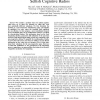54 search results - page 5 / 11 » Complexity Results about Nash Equilibria |
MSS
2010
IEEE
14 years 11 months ago
2010
IEEE
We consider four different game-theoretic approaches to describe the formation of social networks under mutual consent and costly communication. First, we consider Jackson-Wolins...
124
click to vote
SIGECOM
2006
ACM
15 years 7 months ago
2006
ACM
In traditional game theory, players are typically endowed with exogenously given knowledge of the structure of the game—either full omniscient knowledge or partial but fixed in...
102
click to vote
AAAI
2006
15 years 2 months ago
2006
Significant work has been done on computational aspects of solving games under various solution concepts, such as Nash equilibrium, subgame perfect Nash equilibrium, correlated eq...
CORR
2010
Springer
15 years 1 months ago
2010
Springer
It is frequently suggested that predictions made by game theory could be improved by considering computational restrictions when modeling agents. Under the supposition that player...
112
click to vote
GLOBECOM
2009
IEEE
15 years 5 months ago
2009
IEEE
We consider a problem where two selfish cognitive radio users try to share two channels on which they each have potentially different valuations. We first formulate the problem as ...


